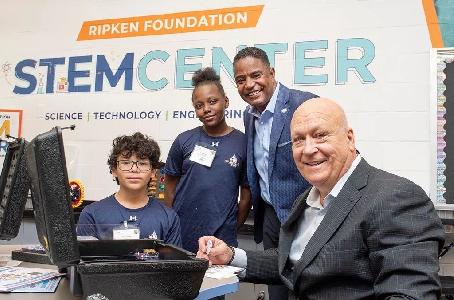A crowd of about 80 people gathered to hear the final presentations from Startup Weekend Education.
“What is it that you want to do to change education?”
This was the question Andrew Coy posed to participants at Baltimore’s first-ever Startup Weekend Education, who, as of late afternoon Sunday, had spent close to 54 hours on the ground floor of AOL/Advertising.com forming startup companies with people they previously hadn’t known.
But after a 30-minute deliberation among the six judges assembled, among them city CIO Chris Tonjes and social entrepreneur (and One Big Idea participant) Rodney Foxworth, three teams of the eight total that had been formed over the weekend walked out with prizes in hand: Bmore Heard in third place, coursefly in second and Challenge Box in first.
Technically Baltimore’s list of all startups from the weekend is below.
Coy, co-executive director of the Digital Harbor Foundation and a co-organizer of the education technology-focused Startup Weekend, was joined by Startup Weekend employee and the night’s emcee Khalid Smith, who said the distinguishing feature between education weekends and traditional Startup Weekend events is figuring out “how to build the cadre of people who are equipped … [to solve] real education problems.”
Watch Andrew Coy speak before presentations at Startup Weekend Education:
[youtube http://www.youtube.com/watch?v=4EgOysqFh9U&w=550&h=309]
Teams formed at Startup Weekend:
- Challenge Box: A decidedly “low-tech” venture for a Startup Weekend, Challenge Box is a physical box with building materials inside (think: Popsicle sticks and rubberbands). Each box corresponds to a series of adventure stories designed around specific topics to create a “full transmedia experience,” as the team explained: digital books and videos guide students through each box. So, if your ship exploring the Antarctic happens to be sinking, you can either click to bail the ship out, or click to bail ship. And then figure out a way to build a bridge using four cups and a rubberband. MacGyver, we see you. First place prize: A Microsoft Surface tablet and $500 to split among team members.
- coursefly: Ah, college, that time in life when keg stands were a form of social currency. It was also home to frustrating daylong periods of time where people agonized over signing up for next semester’s courses. With coursefly, those concerns are things of the past. It’s an online dashboard that allows any student, from any university, to sign up for classes, and then presents the relevant information — the courses you’re taking, your grades in those courses, credits needed for graduation — on a single webpage. Second place prize: An iPad and $300 to split among team members.
- Bmore Heard: The food in your high school’s cafeteria is awful, and you want to do something about it. As Keimmie Booth from Western High School said, “There’s a gap between students and educational decision makers.” With Bmore Heard, Baltimore city school students can record videos of their grievances, upload them to the site and then advocate for what improvements they’d like to see in their own schools. The best part? City CIO (and weekend judge) Chris Tonjes announced that the city’s IT department will build the Bmore Heard website. Third place prize: $300 to split among team members.
- Dr. Octopus: This ain’t your daddy’s Google search. Instead of having teachers sift through a number of irrelevant search results after a “Dante’s Inferno” query, Dr. Octopus sifts through and organizes relevant content for teachers, who can then place applicable links into lists to send to students.
- BOLD: A mobile app for keeping track of application and scholarship deadlines. Guidance counselors are given a “dashboard view” of the app to make sure students using it are on schedule to meet deadlines.
- Nominote: A mobile application that’s a game for helping professors learn the names of their students. Photos of students pop up on a phone’s screen, and then the professor playing has to match the face to one of three names they’re given.
- UnBlockEdTech: A web, Android and iOS app that uses crowdsourced data to figure out which websites students want school districts to unblock. Students vote “up” or “down” (so, how Reddit organizes content) on the sites they think should be unblocked, and then that information is sent to school districts for administrators’ final say. Of course, the websites in question have to be educational in nature.
- SparkEngine: An online, glorified portfolio site for educators and “makers” (i.e. people who love CNC machines and MakerBots) to meet one another and figure out how to bring maker-education into teachers’ classrooms.
Join the conversation!
Find news, events, jobs and people who share your interests on Technical.ly's open community Slack

Baltimore daily roundup: B-360's policy moves; a foundation's fight for financial inclusion; Digital Navigator training

Baltimore daily roundup: Johns Hopkins dedicates The Pava Center; Q1's VC outlook; Cal Ripken inaugurates youth STEM center

Baltimore daily roundup: Scenes from an epic Sneaker Ball; Backpack Healthcare in Google AI accelerator; local tech figures' podcast

